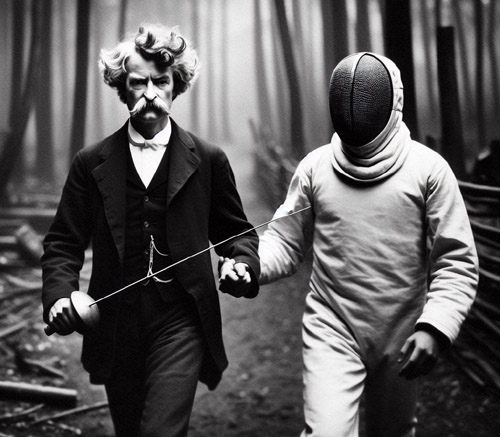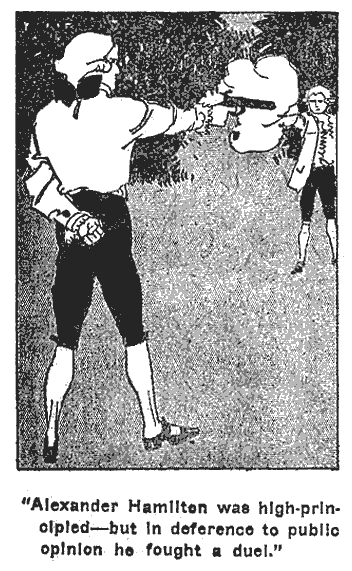

|
I thoroughly disapprove of duels. I consider them unwise
and I know they are dangerous. Also, sinful. If a man should challenge
me, I would take him kindly and forgivingly by the hand and lead him to
a quiet retired spot and kill him.
- Autobiography of Mark Twain, Vol. 1 (2010) |
 AI image created by R. Kent Rasmussen |
 Illustration from AMERICAN EXAMINER, 1910 from the Dave Thomson collection |
Alexander Hamilton was a conspicuously high-principled
man. He regarded dueling as wrong, and as opposed to the teachings of religion--but
in deference to public opinion he fought a duel. He deeply loved his family,
but to buy public approval he treacherously deserted them and threw his
life away, ungenerously leaving them to lifelong sorrow in order that he
might stand well with a foolish world. In the then condition of the public
standards of honor he could not have been comfortable with the stigma upon
him of having refused to fight. The teachings of religion, his devotion
to his family, his kindness of heart, his high principles, all went for
nothing when they stood in the way of his spiritual comfort. A man will
do anything, no matter what it is, to secure his spiritual comfort; and
he can neither be forced nor persuaded to any act which has not that goal
for its object. Hamilton`s act was compelled by the inborn necessity of
contenting his own spirit; in this it was like all the other acts of his
life, and like all the acts of all men`s lives. Do you see where the kernel
of the matter lies? A man cannot be comfortable without his own approval.
He will secure the largest share possible of that, at all costs, all sacrifices. - "What Is Man?" |
|
In those early days dueling suddenly became a fashion in the new territory
of Nevada and by 1864 everybody was anxious too have a chance in the new
sport, mainly for the reason that he was not able to thoroughly respect
himself so long as he had not killed or crippled somebody in a duel or
been killed or crippled in one himself....I was ambitious in several ways
but I had entirely escaped the seductions of that particular craze. I
had had no desire to fight a duel. I had no intention of provoking one.
I did not feel respectable but I got a certain amount of satisfaction
out of feeling safe. I was ashamed of myself...but I got along well enough.
I had always been accustomed to feeling ashamed of myself, for one thing
or another, so there was no novelty for me in the situation. I bore it
very well. This pastime is as common in Austria to-day as it is in France. But with
this difference--that here in the Austrian states the duel is dangerous,
while in France it is not. Here it is tragedy, in France it is comedy;
here it is a solemnity, there it is monkeyshines; here the duelist risks
his life, there he does not even risk his shirt. Here he fights with pistol
or saber, in France with a hairpin--a blunt one. Here the desperately
wounded man tries to walk to the hospital; there they paint the scratch
so that they can find it again, lay the sufferer on a stretcher, and conduct
him off the field with a band of music. |
Quotations | Newspaper Articles | Special Features | Links | Search